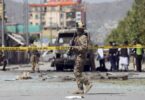GAZA: Fifty Palestinians have been killed by Israeli strikes in Gaza’s Beit Lahiya, Khan Younis and al-Maghazi areas on Thursday, the Gaza Health Ministry said. The Palestinian Red Crescent says at least 10 people have been killed and 12 injured in an attack near al-Amal Hospital in the southern city of Khan Younis.
Ajith Sunghay, the head of the UN Human Rights office in the occupied Palestinian territories, has told Al Jazeera a lack of accountability – and in some cases egging on from Israeli officials – has led to a spike in both settler violence and violence committed by Israeli forces in the occupied West Bank.
Notably, Sunghay said, there has been an increase in group settler attacks on Palestinians. He spoke shortly after the UN agency released a report calling on Israel to curtail the violence, which has resulted in the death of 291 Palestinians in the occupied West Bank since October 7. Israeli settlers killed eight of those victims, and one Palestinian was killed either by Israeli troops or settlers, according to the report.
“I think that’s extremely important to underscore – where there is impunity violations will continue to happen,” he said. He added: “These statements [from Israeli officials] embolden settlers, give them a sense of security, it gives them a certain kind of permission to do what they want to do.” A Palestinian man has been killed by Israeli forces near the tunnel checkpoint, west of Bethlehem. The ministry of health identified the man as Muhammad Sayel Abdelqader al-Jundi, 38, from Yatta, south of Hebron in the occupied West Bank. He was taken to the Beit Jala Hospital where he was pronounced dead.
The US Treasury says in a statement that it has sanctioned the head of the Currency Exchangers Association in Sanaa, Yemen, and three exchange houses in Yemen and Turkey. The entities are “responsible for facilitating the flow of Iranian financial assistance to Houthi forces and their destabilizing activities,” the Treasury said. “Today’s action underscores our resolve to restrict the illicit flow of funds to the Houthis, who continue to conduct dangerous attacks on international shipping and risk further destabilizing the region,” said Treasury official Brian E Nelson, according to the statement.
Last week, the US announced the formation of an international coalition to counter the effects of the Yemeni group’s continued attacks on commercial vessels in the Red Sea, which the Houthis say are being carried out in sympathy with the Palestinians. Houthi officials have said that this coalition will not deter them. The meeting will reportedly be the first time the cabinet, created at the beginning of the war, will discuss what happens when Israeli operations in Gaza eventually end.
Prime Minister Netanyahu has previously rejected the prospect of an international force taking control of the enclave, saying Israel would take indefinite control of Gaza’s security. Netanyahu has also said that neither Hamas nor the Palestinian Authority would take administrative control of Gaza, but he has not presented a more detailed plan. Far-right minister Itamar Ben-Gvir criticised the reported meeting on X, saying the war cabinet was created to manage the war, not “the day after”. Ben-Gvir is not a member of the war cabinet, but is a member of the wider security cabinet.
Antony Loewenstein, an Australian-German freelance investigative journalist and author, says that even before October 7, the majority of Israeli-Jewish citizens favoured the relocation of Palestinians from Gaza. “Israeli-Jewish society has been radicalised,” Loewenstein said. “There was a poll just this week that found 70-80 percent of Israeli Jews support the idea of finding somewhere else for Palestinians in Gaza to be removed. Israel claims that this is somehow voluntary, which is nonsense.
“Gaza is being made uninhabitable deliberately and therefore there are many other countries that are potentially being forced or strong-armed or offered other deals … to take in Palestinians.” Bribing other countries to take in Palestinians has been a decades-old policy of Israel, the author said. “As soon as the 1967 war happened there was a convening of the Israeli cabinet and there was a serious discussion at the highest levels to find ways to remove what they regarded as ‘excess Arabs’ that would dilute – in their view – the Jewish population,” he said.
“It’s never really worked. Virtually no Palestinians wanted to leave, and no other nations have been bribed enough. But the plan has always been there and that has accelerated since October 7.” Sofi Orr, who has refused to enlist in the Israeli army, tells Al Jazeera that she will not take part in what she describes as the Israeli army’s “violent policies of oppression and apartheid”. — Aljazeera







